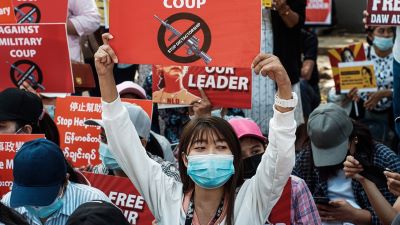Context
In the tumultuous landscape of Myanmar, the past three years have witnessed a series of seismic shifts, starting with the military coup that toppled the democratically elected government led by Aung San Suu Kyi. This coup led to widespread discontent, triggering a massive civil disobedience movement and the formation of a National Unity Government by the deposed members of parliament. The ensuing conflict between the military, ethnic armed organizations, and the People's Defence Forces (PDFs) has reshaped the political and territorial dynamics of the country.
The Unraveling Peace: Ethnic Armed Organizations and PDFs
One of the unintended consequences of the coup has been the erosion of national unity, with the military conceding significant territorial control to ethnic armed organizations and PDFs. The Arakan Army, Myanmar National Democratic Alliance Army, and Ta’ang National Liberation Army orchestrated coordinated attacks, leading to substantial losses for the military, particularly in the Shan State. Paletwa, a critical node in India's Kaladan project, now lies under the control of the Arakan Army, showcasing the geopolitical implications of Myanmar's internal strife.
This territorial loss is not unprecedented for the Myanmar military, which has historically faced challenges from ethnic armed groups. However, the current situation is exacerbated by a unique set of circumstances. Despite a decade-long period of international sanctions being diluted between 2010 and 2020, the military augmented its air and army capabilities. Yet, reports indicate that the armed forces struggle with recruitment, even in regions dominated by the Bamar ethnic community, the backbone of the army. Sporadic accounts of government officials, doctors, and police personnel aligning with the resistance movement highlight a growing internal dissent that transcends ethnic lines.
Military Cohesion and Internal Discontent
The coup leaders' reliance on firepower against unarmed civilians has led to significant internal displacement and neighboring countries grappling with refugee crises. This loss of territory is not solely attributed to military incapacity but is intertwined with a rising tide of popular discontent. Recruitment challenges, reports of military personnel surrendering to ethnic armed groups, and soldiers seeking refuge across borders all point to a military cohesion under increasing stress. The reported punitive actions against officers failing to prevent desertions underscore the internal challenges faced by the Myanmar military.
China's Strategic Calculations
Amidst Myanmar's internal strife, China has adopted a multi-layered strategy to safeguard its interests. On international platforms, Beijing staunchly defends the Myanmar military from global criticism. Simultaneously, ethnic armed organizations along Myanmar's northern border maintain close ties with China, suggesting a level of Chinese consent in the conflict dynamics. Rumors circulate that Beijing utilized this ethnic alliance to quell criminal syndicates harming Chinese citizens. Having achieved its goals, China brokered a ceasefire between rebels and the Myanmar army. However, the long-term sustainability of this truce remains uncertain, as the influence Beijing exerts over both coup leaders and ethnic armed groups raises questions about the parties' comfort with external interference.
ASEAN's Limited Impact and Thailand's Role
The Association of Southeast Asian Nations (ASEAN), a key regional actor, has struggled to influence Myanmar's trajectory. Despite articulating a five-point consensus and denying the Myanmar military a place at its summits, ASEAN's impact remains limited. Efforts by the ASEAN special envoy to Myanmar have faced obstacles, preventing meaningful interactions with all stakeholders. Some ASEAN members have departed from their customary reticence, openly criticizing the Myanmar coup. Thailand, with its significant influence due to a shared border of approximately 2,416 km, has engaged with Myanmar on multiple fronts. Last year, Thailand's Foreign Minister interacted with both Myanmar's military leadership and the imprisoned Aung San Suu Kyi. Thailand's proactive engagement with Myanmar's exile organizations and humanitarian efforts underscores its pivotal role in the region.
India's Strategic Considerations
With a shared border and historical ties, India holds a unique position in influencing Myanmar's trajectory. As the unrest persists, India could adopt a more proactive humanitarian approach, providing relief to displaced communities in Myanmar. Such an initiative aligns with India's interests in stabilizing its eastern neighbor and could help mitigate the influx of refugees into India. However, India must navigate three critical political realities.
- Firstly, discontent against the coup shows no signs of abating. The military's promises of conducting elections under proportional representation remain unfulfilled due to the instability it struggles to address.
- Secondly, despite the absence of a charismatic leader and limited international support, the resistance to the coup has displayed remarkable resilience.
- Lastly, Myanmar's political landscape is fractured, with varying degrees of control exerted by the military, ethnic armed organizations, and PDFs in different regions. The military appears to be losing ground more than gaining it, necessitating a recalibration of India's Myanmar policy in consultation with all relevant stakeholders.
|
Cooperation between India and Myanmar
|
Conclusion
As Myanmar grapples with internal strife and external pressures, the trajectory of its political landscape remains uncertain. The military's failure to strengthen national unity through the coup has resulted in significant territorial losses to ethnic armed groups and PDFs. China's strategic maneuvers, ASEAN's limited impact, Thailand's proactive role, and India's potential for humanitarian intervention all contribute to the complex geopolitical tapestry. The enduring resilience of the resistance movement and the fractured political landscape underscore the need for nuanced, well-calibrated policies by regional and international actors. As Myanmar's future hangs in the balance, diplomatic efforts, humanitarian initiatives, and regional cooperation become imperative to navigate the complexities and pave the way for a more stable and inclusive Myanmar.
|
Probable Questions for UPSC Mains Exam
|
Source – The Hindu







